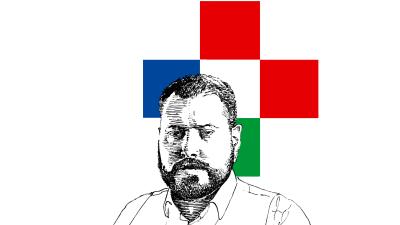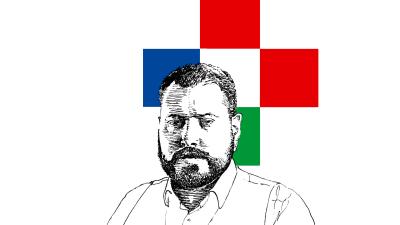For better or worse, the car has revolutionised our way of life, drastically changing our relationship with space. I do not intend to take stock of this revolution here and now. It has happened, and now we are faced with the fact that today, for many people, the car is anything but a luxury product. Indispensable for millions of people for going to work, it is also one of the main pillars of our freedom of movement.
We remember that in the USSR there were internal passports, which limited Soviet citizens' ability to move within their country - not to mention the difficulty of leaving the country.
It seemed, until 2020, inconceivable that our freedom of movement would be restricted again in Europe. But since March 2020, this has returned. For health reasons first, we see that the climate nuts are stepping into the breach to move the Overton window. To "save the climate" (surely the dumbest phrase of this century), some are now openly saying that we should limit everyone's travel indiscriminately. Who wouldn't want to protect the planet? This is the solution that is gradually being imposed: to limit our travel - by force.
In addition to the explosion in fuel prices, the carpooling measures, the exclusion of cars from cities, the ban on internal combustion engines and increasingly stringent technical controls are all measures to encourage people to give up their cars. And all this the voter favouring those measures can do, since he lives in the city centre where everything is done for him, unlike the suburbanite or the provincial.
But this is not all. At the same time, the very concept of the individual car is in danger. At the beginning of 2023, a relatively unnoticed piece of information caused quite a stir in the small world of the automobiles: the American manufacturer Ford filed a patent for a system that would allow bailiffs to automatically retrieve a vehicle, without a driver, in the event of indebtedness.
Initially, in the event of non-payment, it would be possible to remotely deactivate certain vehicle options, such as the radio or heating. Later on, more restrictive measures could be envisaged, such as a permanent noise in the vehicle during its use, or even its partial or total blocking.
The Ford patent states that in the event of an emergency, for example a medical emergency, the vehicle lock could be suspended. In this case, it would be AI together with the vehicle's camera that would decide whether or not to allow the driver to use the vehicle again.
Finally, the seizure of the vehicle could be carried out remotely, without a driver, with the vehicle being taken automatically to the bailiff's office, or to the scrapyard if it is not economically viable to seize it.
This scenario, which might seem to many like something out of a science fiction film, is absolutely real. Admittedly, Ford's project is still in the patent-pending stage. But everything described in the patent is already feasible.
All this has been made possible by the evolution of vehicles, which in recent years have become veritable computers packed with electronics, for better or worse.
Since the summer of 2022, all new vehicles sold in the European Union have been fitted with a black box, just like that on aircrafts. Under the pretext of safety, this device is initially supposed to limit the possibility of a vehicle exceeding the authorised speed limits, notably by reducing the engine speed.
In France, some insurance companies are already offering motorists the chance to install this black box free of charge, in return for a discount on their insurance policy.
However, it is hard not to imagine that this device could be very quickly put to other uses. Let us recall, for example, the very recent period in the spring of 2021, when the French were locked in their homes in the evening and were allowed at certain times of the day to move around within a radius of 10km from their homes.
Another potential use of the modern vehicle technology is the proliferation of radars controlling the "Crit'Air" stickers in urban areas, which tend to establish a real social apartheid in metropolises by reserving the right to travel by car to those who can afford to buy a recent vehicle, or thermal radars controlling the presence of several individuals in traffic lanes reserved for carpooling.
While it is true that car traffic degrades the quality of air and life in cities, it is highly illusory to think that all-electric cars will solve the problem, especially as they will generate other problems. Not to mention that the electric car industry is only clean for the users, as the pollution is relocated.
And again, this means forgetting that part of the pollution generated by the circulation of cars is linked to braking or tyre degradation, problems that exist just as much on old diesels as on brand new electric cars.
Another trend that raises questions is that implemented by the German manufacturer BMW, which consists in charging for certain options, such as heated seats, by a monthly subscription.
Clearly, a consumer buys an (often expensive) vehicle, including equipment present and operational in the car. All this is supposed to belong to him, but he still has to pay for some of these functions by subscription.
This logic, enabled by an expansion of unbridled capitalism and a real regression in the defence of consumer rights, is gradually opening the door to the idea that, in the future, people will no longer own their vehicles, but will at best rent them, for example in the form of leasing.
These trends are all the more worrying in a country like France where public transport services are extremely poor in rural areas, while in many urban areas a significant proportion of the population avoids public transport because of its lack of security.
Clearly, it was probably no coincidence that in 2018, the Gilets Jaunes crisis began with the rise in fuel prices – such is the importance of the individual car for the freedom of the working classes in France.
In face of the current trends, implemented sometimes in the name of security, health measures, the environment or others, the defenders of individual freedoms will have their work cut out to reaffirm the right to move freely, and of course the right to individual property.
Read also
Country Report: Hungary, April 2023
Between 28 and 30 April, Pope Francis travelled to Hungary on an apostolic visit. During that time, he met with Hungarian leaders, visited the faithful and immigrants, and celebrated a large open-air mass in front of the parliament.










Comments (0)